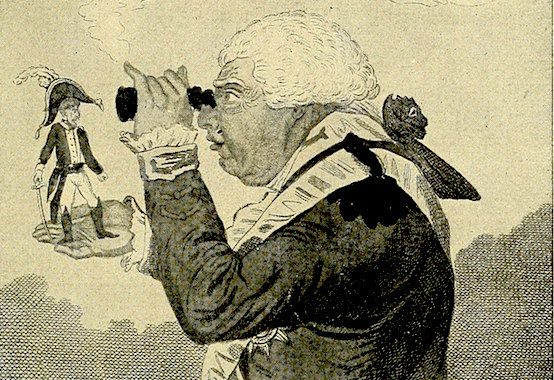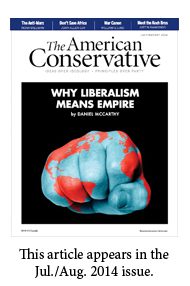Two Cheers for Partisan History

Having recently revisited Herbert Butterfield’s The Whig Interpretation of History, I found myself experiencing second thoughts about a work I once cherished. Butterfield published his book in 1931 to challenge a historical view that had come to dominate the Anglo-American world, one formulated by “Protestant gentlemen of the nineteenth century” and predicated on a self-satisfied conception of human progress. The past was seen as a prelude to our modern age, filled with forerunners and “origins” pointing toward the privileged moment that the historian saw himself as occupying.
Although Butterfield was still wrestling with an older generation of Whig historians, his critical observations seem equally relevant for the present. Butterfield was plainly upset by those who used the past to create political platforms while pretending to be offering scientific studies. So he urges historians to focus on the complexity of circumstances and the interaction of contending sides to understand historical change. There should be no heroes or villains in proper history.
What should be sought are clarifications that come through research. Butterfield is spot-on when he warns against any narrative that “is telescoped into a whig version of abridged history”:
We have to be on guard when the whig historian tells us, for example, that the Reformation is justified because it led ultimately to liberty; we must avoid the temptation to make what seem to be the obvious inferences from this statement; for it is possible to argue against the whig historian that the ultimate issue which he applauds only came in the long run from the fact that, in its immediate results, the Reformation was disastrous for liberty.
Indeed, looking back at the fanatical hatreds of the 16th century, Butterfield concludes: “The real seat of the tragedy lay in the ideas that Luther and Calvin and the Popes held in common and held with equal intensity—the idea that society and government should be founded on the basis of the one authoritative religion.” Impervious to such facts, the Whig historian “likes to imagine religious liberty issuing beautifully out of Protestantism when in reality it emerges painfully and grudgingly out of something quite different, out of the tragedy of the post-Reformation world.”
For Butterfield, “the true historical fervor is that of the man for whom the exercise of historical imagination brings its own rewards, in those inklings of a deeper understanding, those glimpses of a new interpretive truth, which are the historian’s achievement and his aesthetic delight.” Moreover, “by imaginative sympathy he makes the past intelligible to the present,” and he does this in part by being open to “those complications that undermine our certainties and show us that our judgments are merely relative to time and circumstance.” The Whig historian, by contrast, “stops the work of imaginative sympathy at a point that could almost be fixed by a formula.”
Yet despite these admonitions against present-minded, progressive historiography, Butterfield himself was at least intermittently a Whig historian, and it may be best to view him as a chastened member of this school who recognized its limitations but couldn’t escape its grasp. In The Englishman and His History, published in 1943, Butterfield rehabilitated one side of the Whig tradition, the search for—and to some extent invention of—an “ancient law” in which the “historic liberties” of the English people were thought to be grounded. Even in The Whig Interpretation of History, Butterfield praised the achievements of Whig history for showing “that prejudice and passion can make a contribution to historical understanding.”
It may also be useful to proceed from the kind of Whig history that is marked by the “transference into the past of an enthusiasm for something in the present, an enthusiasm for democracy or freedom of thought or the liberal tradition” to a more dispassionate search for origins. One can justifiably view Luther or Calvin, for example, as transitional figures to the modern age without having to anachronistically ascribe to them all the values of the 19th or 20th centuries. There are certainly aspects of the Reformation—such as Luther’s rejection of monasticism and stress on the “priesthood of all believers” or Calvin’s favorable view of commercial loans—that point the way toward a post-medieval society. 
The historian might note these bridges without leaping to unwarranted conclusions about Luther or Calvin as a vindicator of religious liberty. To his credit, Butterfield does indeed observe that Luther and other Protestant Reformers of the 16th century provided “examples of historical mediation, performing what is really a work of transition by carrying what was old into something which we could agree to be genuinely new.”
But perhaps the most important point to be critically re-examined in Butterfield’s case against Whig history is whether historians can or should avoid “judgments of value,” something Butterfield warns against repeatedly. The problem is that Butterfield’s defense of this position jars with some of his underlying assumptions. It is impossible to read a sentence like this one, for example, without noticing the outrage that drenches every word:
I do not know who could deny that the Reformation provoked a revival of religious passions, religious fanaticism and religious hatreds which were unlike the world to which things seemed to be moving in the year 1500; and when we look at Erasmus and Machiavelli and the spirit of the renaissance we must wonder whether freedom of thought and modern rationalism might not have had an easier course if Luther had never resuscitated militant religion.
Who would believe these sentiments came from someone who seeks to remove “value judgments” from the study of history? And what do we do with an oft-quoted aphorism from Butterfield’s 1952 work Christian Diplomacy and War, where we discover this moral claim: “the great menace to our civilization is the conflict between giant organized forms of self-righteousness.” We may want to yell “right on” upon encountering such a fine judgment, but Butterfield is once again violating his own advice.
Some prominent historians whom Butterfield admired tried to do exactly what he urged by coming up with historical studies not soiled by presentist themes and moral judgments. This is a high-minded goal that the medievalist Marc Bloch and the father of 19th-century historical research methods, Leopold von Ranke, tried scrupulously to achieve. But history even at the highest level is rarely done that way. Butterfield himself goes on for pages about the evils of religious strife, while urging the historian to put away his values and present-mindedness. Even in his assault on Whig history, Butterfield writes in a recognizably whiggish spirit.
After we have been told that human achievements are “the result of interaction; they are precipitated by complex history,” Butterfield goes on to invoke the broad panorama of “the evolution of constitutional government and religious liberty.”
Supposedly we should be able to “see this evolution as the cooperative achievement of all humanity, whig and tory, assisting in spite of themselves.” Might we also notice here something akin to Hegel’s World Spirit, which works through human fumbling to bring about happy outcomes? That may not be a case of reading too much into a text, even one that was prepared as warning against the “whig interpretation of history.”
Paul Gottfried is the author of Leo Strauss and the Conservative Movement in America.
Comments